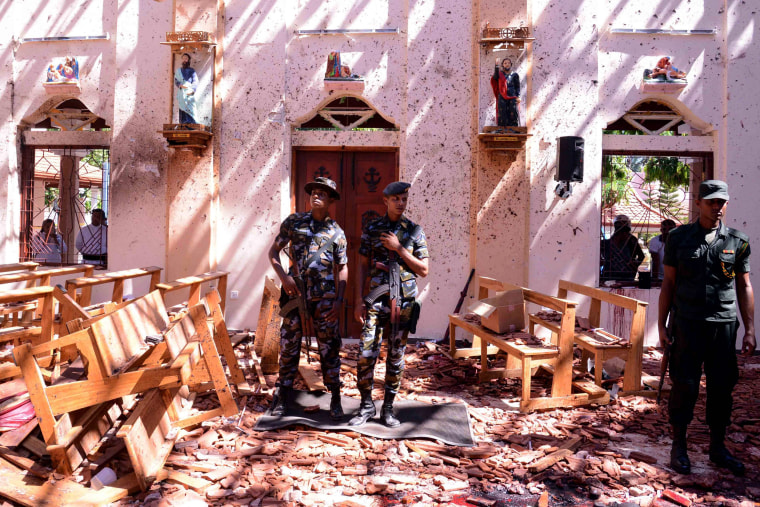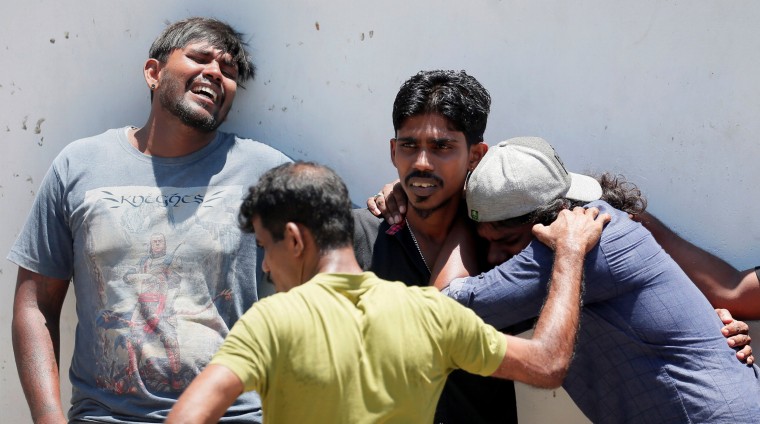COLOMBO, Sri Lanka — At least 290 people were killed and 500 others injured after a series of blasts shook Sri Lanka on Easter Sunday.
A wave of near-simultaneous explosions rocked three churches and three luxury hotels, officials said. Police later reported two further explosions.
Police said Monday that 24 suspects had been arrested.
The government declared an island-wide curfew and said it had shut down access to major social media sites and messaging services, including Facebook and WhatsApp, to prevent misinformation and rumors.
There were no immediate claims of responsibility for the attacks.
Defense Minister Ruwan Wijewardena said the death toll included at least 27 foreign nationals. He described the attacks as a terrorist incident, and blamed religious extremists.
In a statement, Secretary of State Mike Pompeo confirmed that several of those killed were Americans.
"The U.S. Embassy is working tirelessly to provide all possible assistance to the American citizens affected by the attacks and their families," Pompeo said.

Police conducted a search operation on the outskirts of Colombo, where the latest of eight blasts took place. After police moved in, at least two more blasts occurred, with the occupants of a safehouse apparently blasting explosives to prevent arrest. Three officers were killed.
Prime Minister Ranil Wickremesinghe said he feared the violence could trigger instability in the country and its economy.
He said his government would "vest all necessary powers with the defense forces" to take action against those responsible for the attacks, "regardless of their stature."
Download the NBC News app for breaking news and politics
A security official told The Associated Press that two of the blasts were suspected to have been carried out by suicide bombers. The official spoke on condition of anonymity as he was not authorized to speak with reporters.
The first blast ripped through St. Anthony's Shrine in Colombo. The church and the three hotels in the country's capital are frequented by foreign tourists.
A second explosion was reported at St. Sebastian's Church in Negombo, a Catholic majority town north of Colombo.
More than 50 people were killed in that blast alone, a police official told Reuters, with pictures showing bodies on the ground, blood on the pews and a destroyed roof.

Father Edmond Tillekeratne, the social communications director of the Archdiocese of Colombo, was near St. Sebastian's when the explosion happened.
"I was close by, so I ran there. I saw the aftermath with my own eyes," he told NBC News.
"The rooftop is completely destroyed. The flesh of the people is on the walls and all over the place."
The third church that was targeted is in the eastern town of Batticaloa.
Pope Francis denounced the "cruel violence" and added an appeal at the end of his Easter Sunday blessing to address the massacre.
"I want to express my loving closeness to the Christian community, targeted while they were gathered in prayer, and all the victims of such cruel violence," he said. "I entrust to the Lord all those who were tragically killed and pray for the injured and all those who are suffering as a result of this dramatic event."
The first three hotels hit were the Shangri-La Colombo, Kingsbury Hotel and Cinnamon Grand Colombo.
President Donald Trump tweeted his condolences and said the U.S. stands "ready to help!"
Akshat Saraf, from Bangalore, India, was staying at the Shangri-La hotel with his family when the blasts hit.
"We were in our room on the 25th floor when we felt strong tremors. We rushed downstairs fearing an earthquake," he told NBC News. "Once out of the building we saw a flurry of emergency responders and ambulances ferrying injured guests."
The blasts follow a lull in major attacks since the end of Sri Lanka's civil war 10 years ago. The island nation of nearly 23 million people was at war for decades with Tamil separatists until 2009, during which bomb blasts in the capital were common.
Sri Lanka has long faced a bitter ethnic divide between the majority Sinhalese and the minority Tamils, fueling the civil war as Tamil militants tried to carve out their own homeland.
Sinhalese are overwhelmingly Buddhists, while Tamils are mostly Hindu, Muslim and Christian.
Sri Lanka has a population of around 22 million. Around 70 percent are Buddhist, 12.6 percent Hindu, 9.7 percent Muslim, and 7.6 percent Christian, according to the country's 2012 census.
Last year, there were 86 verified incidents of discrimination, threats and violence against Christians, according to the National Christian Evangelical Alliance of Sri Lanka (NCEASL), which represents more than 200 churches and other Christian organizations.
This year, the group recorded 26 such incidents.
In its 2018 report on Sri Lanka's human rights, the State Department noted that some Christian groups and churches reported they had been pressured to end worship activities after authorities classified them as "unauthorized gatherings."
Shammas Ghouse reported from Colombo, and Yuliya Talmazan and Caroline Radnofsky from London.